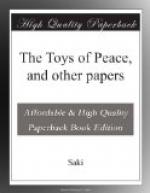“Are we to play with these civilian figures?” asked Eric.
“Of course,” said Harvey, “these are toys; they are meant to be played with.”
“But how?”
It was rather a poser. “You might make two of them contest a seat in Parliament,” said Harvey, “an have an election—”
“With rotten eggs, and free fights, and ever so many broken heads!” exclaimed Eric.
“And noses all bleeding and everybody drunk as can be,” echoed Bertie, who had carefully studied one of Hogarth’s pictures.
“Nothing of the kind,” said Harvey, “nothing in the least like that. Votes will be put in the ballot-box, and the Mayor will count them—and he will say which has received the most votes, and then the two candidates will thank him for presiding, and each will say that the contest has been conducted throughout in the pleasantest and most straightforward fashion, and they part with expressions of mutual esteem. There’s a jolly game for you boys to play. I never had such toys when I was young.”
“I don’t think we’ll play with them just now,” said Eric, with an entire absence of the enthusiasm that his uncle had shown; “I think perhaps we ought to do a little of our holiday task. It’s history this time; we’ve got to learn up something about the Bourbon period in France.”
“The Bourbon period,” said Harvey, with some disapproval in his voice.
“We’ve got to know something about Louis the Fourteenth,” continued Eric; “I’ve learnt the names of all the principal battles already.”
This would never do. “There were, of course, some battles fought during his reign,” said Harvey, “but I fancy the accounts of them were much exaggerated; news was very unreliable in those days, and there were practically no war correspondents, so generals and commanders could magnify every little skirmish they engaged in till they reached the proportions of decisive battles. Louis was really famous, now, as a landscape gardener; the way he laid out Versailles was so much admired that it was copied all over Europe.”
“Do you know anything about Madame Du Barry?” asked Eric; “didn’t she have her head chopped off?”
“She was another great lover of gardening,” said Harvey, evasively; “in fact, I believe the well known rose Du Barry was named after her, and now I think you had better play for a little and leave your lessons till later.”
Harvey retreated to the library and spent some thirty or forty minutes in wondering whether it would be possible to compile a history, for use in elementary schools, in which there should be no prominent mention of battles, massacres, murderous intrigues, and violent deaths. The York and Lancaster period and the Napoleonic era would, he admitted to himself, present considerable difficulties, and the Thirty Years’ War would entail something of a gap if you left it out altogether. Still, it would be something gained if, at a highly impressionable age, children could be got to fix their attention on the invention of calico printing instead of the Spanish Armada or the Battle of Waterloo.




